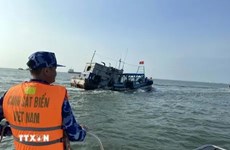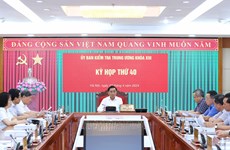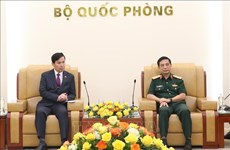PM’s visit provides renewed energy to VN-Australia relations
Emeritus Professor Carl Thayer from the Australian Defence Force Academy
has described Prime Minister Nguyen Tan Dung’s upcoming visit to
Australia as providing a renewed impetus to bilateral relations.
Emeritus Professor Carl Thayer from the Australian Defence Force Academy
has described Prime Minister Nguyen Tan Dung’s upcoming visit to
Australia as providing a renewed impetus to bilateral relations.
Following is the professor’s evaluation of current Vietnam-Australia relations and future prospect and Prime Minister Nguyen Tan Dung’s visit.
“Vietnam’s Prime Minister Nguyen Tan Dung will make a two-day official visit to Australia at the invitation of Prime Minister Tony Abbott from March 17-18.
This visit is particularly important because the current Australia-Vietnam Plan of Action (2010-13) to implement the 2009 comprehensive partnership expired over a year ago. In September 2013 Australia changed government. And the following year it hosted the G20 Summit that crowded out the diplomatic calendar.
Prime Minister Dung’s visit will provide renewed energy to bilateral relations. The two sides will raise Australia-Vietnam relations to an Enhanced Comprehensive Partnership. This will serve as the foundation for a second Plan of Action that will develop new areas of cooperation and refocused priorities for the coming years.
Since 2009 relations between Australia and Vietnam have developed comprehensively in both breadth and depth. Cooperation between two nations takes place in some main areas: bilaterally; regionally and internationally; economic growth, trade and industry development; development assistance; and defence, law enforcement and security ties.
To take one example, two-way trade between Australia and Vietnam rose from 32 million USD in 1990 to 6 billion USD in 2014. Australian direct investment in Vietnam rose to 1.65 billion USD last year. Overall, Vietnam is Australia’s fastest growing trade partner among all ASEAN countries.
Australia and Vietnam share a growing convergence of interests due to changes in the security environment in the Indo-Pacific region caused by changes in the distribution of power among the major powers and the increased salience of non-traditional security issues. Australia and Vietnam share common interests in regional stability, regional security and continued economic growth.
In the future, Australia and Vietnam will work more closely together in multilateral institutions to address international and regional security concerns. This includes cooperation in the United Nations, East Asia Summit (EAS), Asia Pacific Economic Cooperation (APEC), the Association of Southeast Asian Nations (ASEAN) and ASEAN-centered bodies such as the ASEAN Regional Forum, ASEAN Defence Ministers’ Meeting Plus and the Enlarged ASEAN Maritime Forum.
Importantly, Australia and Vietnam will cooperate to make the EAS a leader-led forum to discuss overarching strategic issues in East Asia.
Australia and Vietnam will work together to implement the ASEAN-Australia-New Zealand Free Trade Agreement and to complete the Trans-Pacific Partnership Agreement and the Regional Comprehensive Economic Partnership.
Both Australia and Vietnam share a convergence on interests in promoting more open global trade and investment through the World Trade Organisation, APEC, Asia-Europe Meeting and the Cairns Group of agricultural traders. Both are in agreement to support a heightened role for the private sector.
Two of the mainstays of bilateral cooperation are exchanges of high-level visits by party, government and parliamentary officials and wide-ranging people-to-people exchanges. Australia is home to 300,000 Vietnamese. In 2015, an estimated 30,000 students from Vietnam were enrolled in Australian training institutes, schools, colleges and universities.
Australia and Vietnam share a convergence of views on territorial disputes in the East Sea. Both sides hold that such disputes should be settled peacefully without resort to force through dialogue self-restraint by the parties concerned, on the basis of international law including the UN Convention on the Law of the Sea.
Australia and Vietnam have developed extensive linkages in promoting cooperation among defence, security and law enforcement officials.
Vietnam and Australia conduct four major defence dialogues each year, including a meeting between defence ministers. Since defence relations were established in 1999 over 1,200 Vietnamese have been recipients of Australian defence cooperation education and training. Both parties cooperate in aviation and maritime security, peacekeeping, counter-terrorism, Special Forces, and war legacy issues.
Australian and Vietnamese law enforcement official cooperate closely to combat transnational crime such as human trafficking, narcotics smuggling, money laundering and cyber crime.
Under the Australia Vietnam Comprehensive Partnership bilateral relations have deepened and widened considerably. Australia and Vietnam increasingly share a convergence views on political, diplomatic, economic, development, and security and defence issues.
Prime Minister Dung’s visit to Australia provides a renewed impetus for the two countries to advance bilateral relations to an Enhanced Comprehensive Partnership and to adopt a second Plan of Action to implement this agreement in coming year.
The Australian-Vietnam Enhanced Comprehensive Partnership demonstrates the wisdom of Vietnam’s long-standing policy of “multilateralising and diversifying” its external relations and proactively seeking international integration. The Enhanced Comprehensive Partnership also underscores Australia’s role as a middle power that constructively contributes not only to Vietnam’s economic development and security but also to Southeast Asia’s security and economic growth as well."-VNA
Following is the professor’s evaluation of current Vietnam-Australia relations and future prospect and Prime Minister Nguyen Tan Dung’s visit.
“Vietnam’s Prime Minister Nguyen Tan Dung will make a two-day official visit to Australia at the invitation of Prime Minister Tony Abbott from March 17-18.
This visit is particularly important because the current Australia-Vietnam Plan of Action (2010-13) to implement the 2009 comprehensive partnership expired over a year ago. In September 2013 Australia changed government. And the following year it hosted the G20 Summit that crowded out the diplomatic calendar.
Prime Minister Dung’s visit will provide renewed energy to bilateral relations. The two sides will raise Australia-Vietnam relations to an Enhanced Comprehensive Partnership. This will serve as the foundation for a second Plan of Action that will develop new areas of cooperation and refocused priorities for the coming years.
Since 2009 relations between Australia and Vietnam have developed comprehensively in both breadth and depth. Cooperation between two nations takes place in some main areas: bilaterally; regionally and internationally; economic growth, trade and industry development; development assistance; and defence, law enforcement and security ties.
To take one example, two-way trade between Australia and Vietnam rose from 32 million USD in 1990 to 6 billion USD in 2014. Australian direct investment in Vietnam rose to 1.65 billion USD last year. Overall, Vietnam is Australia’s fastest growing trade partner among all ASEAN countries.
Australia and Vietnam share a growing convergence of interests due to changes in the security environment in the Indo-Pacific region caused by changes in the distribution of power among the major powers and the increased salience of non-traditional security issues. Australia and Vietnam share common interests in regional stability, regional security and continued economic growth.
In the future, Australia and Vietnam will work more closely together in multilateral institutions to address international and regional security concerns. This includes cooperation in the United Nations, East Asia Summit (EAS), Asia Pacific Economic Cooperation (APEC), the Association of Southeast Asian Nations (ASEAN) and ASEAN-centered bodies such as the ASEAN Regional Forum, ASEAN Defence Ministers’ Meeting Plus and the Enlarged ASEAN Maritime Forum.
Importantly, Australia and Vietnam will cooperate to make the EAS a leader-led forum to discuss overarching strategic issues in East Asia.
Australia and Vietnam will work together to implement the ASEAN-Australia-New Zealand Free Trade Agreement and to complete the Trans-Pacific Partnership Agreement and the Regional Comprehensive Economic Partnership.
Both Australia and Vietnam share a convergence on interests in promoting more open global trade and investment through the World Trade Organisation, APEC, Asia-Europe Meeting and the Cairns Group of agricultural traders. Both are in agreement to support a heightened role for the private sector.
Two of the mainstays of bilateral cooperation are exchanges of high-level visits by party, government and parliamentary officials and wide-ranging people-to-people exchanges. Australia is home to 300,000 Vietnamese. In 2015, an estimated 30,000 students from Vietnam were enrolled in Australian training institutes, schools, colleges and universities.
Australia and Vietnam share a convergence of views on territorial disputes in the East Sea. Both sides hold that such disputes should be settled peacefully without resort to force through dialogue self-restraint by the parties concerned, on the basis of international law including the UN Convention on the Law of the Sea.
Australia and Vietnam have developed extensive linkages in promoting cooperation among defence, security and law enforcement officials.
Vietnam and Australia conduct four major defence dialogues each year, including a meeting between defence ministers. Since defence relations were established in 1999 over 1,200 Vietnamese have been recipients of Australian defence cooperation education and training. Both parties cooperate in aviation and maritime security, peacekeeping, counter-terrorism, Special Forces, and war legacy issues.
Australian and Vietnamese law enforcement official cooperate closely to combat transnational crime such as human trafficking, narcotics smuggling, money laundering and cyber crime.
Under the Australia Vietnam Comprehensive Partnership bilateral relations have deepened and widened considerably. Australia and Vietnam increasingly share a convergence views on political, diplomatic, economic, development, and security and defence issues.
Prime Minister Dung’s visit to Australia provides a renewed impetus for the two countries to advance bilateral relations to an Enhanced Comprehensive Partnership and to adopt a second Plan of Action to implement this agreement in coming year.
The Australian-Vietnam Enhanced Comprehensive Partnership demonstrates the wisdom of Vietnam’s long-standing policy of “multilateralising and diversifying” its external relations and proactively seeking international integration. The Enhanced Comprehensive Partnership also underscores Australia’s role as a middle power that constructively contributes not only to Vietnam’s economic development and security but also to Southeast Asia’s security and economic growth as well."-VNA













